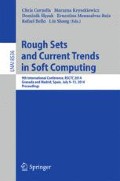Abstract
In this paper, dual fuzzy rough approximation operators determined by a fuzzy implication operator \({\cal I}\) in infinite universes of discourse are first introduced. Measurable structures of \({\cal I}\)-fuzzy rough sets are then discussed. It is shown that the family of all definable sets in an \({\cal I}\)-fuzzy rough set algebra derived from a reflexive fuzzy space forms a σ-fuzzy algebra. In a finite universe of discourse, the family of all definable sets in a serial \({\cal I}\)-fuzzy rough set algebra is a fuzzy algebra, and conversely if a σ-fuzzy algebra is generated by a crisp algebra, then there must exist an \({\cal I}\)-fuzzy rough set algebra such that the family of all definable sets is exactly the given σ-fuzzy algebra.
Access this chapter
Tax calculation will be finalised at checkout
Purchases are for personal use only
Preview
Unable to display preview. Download preview PDF.
References
Cornelis, C., Deschrijver, G., Kerre, E.E.: Implication in intuitionistic fuzzy and interval-valued fuzzy set theory: construction, classification, application. International Journal of Approximate Reasoning 35, 55–95 (2004)
Halmos, P.R.: Measure Theory. Van Nostrand-Reinhold, New York (1950)
Klement, E.P.: Fuzzy σ-algebras and fuzzy measurable functions. Fuzzy Sets and Systems 4, 83–93 (1980)
Klement, E.P., Mesiar, R., Pap, E.: Triangular Norms. In: Trends in Logic, vol. 8, Kluwer Academic Publishers, Dordrecht (2000)
Klir, G.J., Yuan, B.: Fuzzy Logic: Theory and Applications. Prentice-Hall, Englewood Cliffs (1995)
Mi, J.-S., Leung, Y., Zhao, H.-Y., Feng, T.: Generalized fuzzy rough sets determined by a triangular norm. Information Sciences 178, 3203–3213 (2008)
Mi, J.-S., Zhang, W.-X.: An axiomatic characterization of a fuzzy generalization of rough sets. Information Sciences 160, 235–249 (2004)
Ouyang, Y., Wang, Z.D., Zhang, H.-P.: On fuzzy rough sets based on tolerance relations. Information Sciences 180, 532–542 (2010)
Pawlak, Z.: Rough Sets: Theoretical Aspects of Reasoning about Data. Kluwer Academic Publishers, Boston (1991)
Ruan, D., Kerre, E.E.: Fuzzy implication operators and generalized fuzzy method of cases. Fuzzy Sets and Systems 54, 23–37 (1993)
Wu, W.-Z.: On some mathematical structures of T-fuzzy rough set algebras in infinite universes of discourse. Fundamenta Informaticae 108, 337–369 (2011)
Wu, W.-Z., Mi, J.-S.: Some mathematical structures of generalized rough sets in infinite universes of discourse. In: Peters, J.F., Skowron, A., Chan, C.-C., Grzymala-Busse, J.W., Ziarko, W.P. (eds.) Transactions on Rough Sets XIII. LNCS, vol. 6499, pp. 175–206. Springer, Heidelberg (2011)
Wu, W.-Z., Leung, Y., Shao, M.-W.: Generalized fuzzy rough approximation operators determined by fuzzy implicators. International Journal of Approximate Reasoning 54, 1388–1409 (2013)
Wu, W.-Z., Zhang, W.-X.: Constructive and axiomatic approaches of fuzzy approximation operators. Information Sciences 159, 233–254 (2004)
Wu, W.-Z., Zhang, W.-X.: Rough set approximations vs. measurable spaces. In: IEEE International Conference on Granular Computing, pp. 329–332. IEEE Press, New York (2006)
Yao, Y.Y.: Generalized rough set model. In: Polkowski, L., Skowron, A. (eds.) Rough Sets in Knowledge Discovery 1. Methodology and Applications, pp. 286–318. Physica-Verlag, Heidelberg (1998)
Yeung, D.S., Chen, D.G., Tsang, E.C.C., Lee, J.W.T., Wang, X.Z.: On the generalization of fuzzy rough sets. IEEE Transactions on Fuzzy Systems 13, 343–361 (2005)
Zadeh, L.A.: Probability measures of fuzzy events. Journal of Mathematical Analysis and Applications 23, 421–427 (1968)
Author information
Authors and Affiliations
Editor information
Editors and Affiliations
Rights and permissions
Copyright information
© 2014 Springer International Publishing Switzerland
About this paper
Cite this paper
Wu, WZ., Mu, XF., Xu, YH., Wang, X. (2014). Measurable Structures of \({\cal I}\)-Fuzzy Rough Sets. In: Cornelis, C., Kryszkiewicz, M., Ślȩzak, D., Ruiz, E.M., Bello, R., Shang, L. (eds) Rough Sets and Current Trends in Computing. RSCTC 2014. Lecture Notes in Computer Science(), vol 8536. Springer, Cham. https://doi.org/10.1007/978-3-319-08644-6_9
Download citation
DOI: https://doi.org/10.1007/978-3-319-08644-6_9
Publisher Name: Springer, Cham
Print ISBN: 978-3-319-08643-9
Online ISBN: 978-3-319-08644-6
eBook Packages: Computer ScienceComputer Science (R0)

